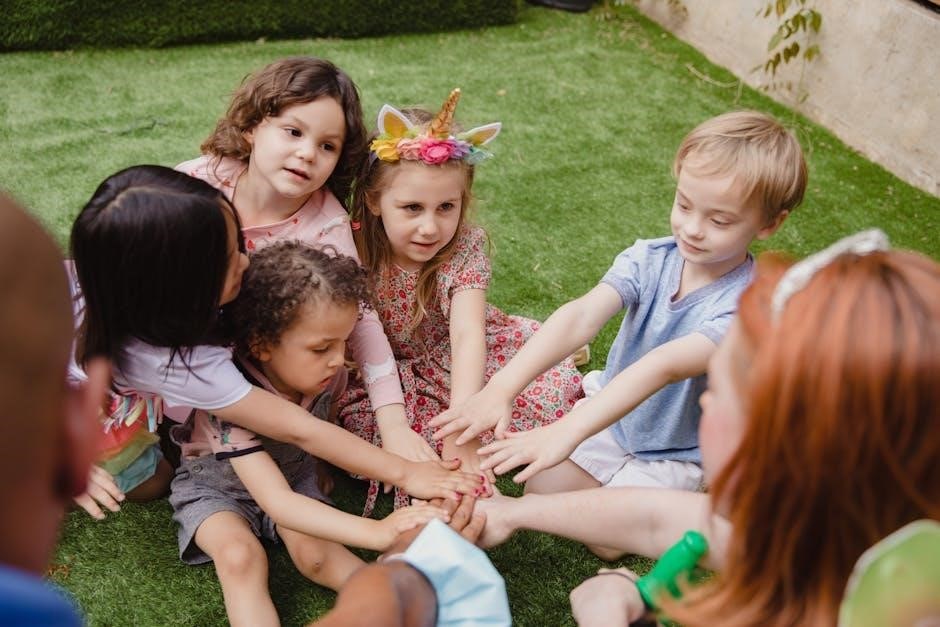
Recovery games are structured activities enhancing group therapy through engagement, reflection, and connection. They offer various exercises fostering communication, emotional expression, and mindfulness, creating a supportive environment for shared experiences and trust-building in recovery.
Overview of Recovery Games in Group Therapy
Recovery games are interactive activities designed to enhance group therapy sessions by fostering engagement, reflection, and connection among participants. These games create a safe and dynamic environment where individuals can share experiences, build trust, and explore emotions. They often involve exercises that promote open communication, mindfulness, and self-expression, helping participants process their recovery journey; Examples include icebreakers like Two Truths and a Lie and Gratitude Graphs, which encourage personal sharing and positivity. These activities not only strengthen peer connections but also provide a platform for creative expression and education, making therapy more accessible and enjoyable. By integrating fun and meaningful exercises, recovery games play a vital role in facilitating healing and growth within group settings.
Importance of Interactive Activities in Recovery
Interactive activities play a crucial role in recovery by creating engaging and meaningful experiences for participants. They break down barriers, fostering a sense of community and shared purpose among group members. These exercises encourage active participation, helping individuals express emotions, address challenges, and develop coping strategies. By making therapy more dynamic and relatable, interactive activities enhance motivation and commitment to the recovery process. They also provide a platform for learning and growth, allowing participants to gain insights and skills in a supportive environment. Ultimately, these activities empower individuals to take an active role in their healing journey, making recovery more accessible and sustainable.
How Recovery Games Facilitate Healing
Recovery games create a safe and engaging environment where individuals can express emotions, process experiences, and build connections. These activities encourage vulnerability, trust, and collaboration, helping participants confront challenges in a constructive manner. By fostering active participation, recovery games empower individuals to explore their thoughts and feelings openly. They also promote self-reflection and accountability, essential for personal growth and long-term recovery. Interactive elements such as role-playing, art, or group discussions allow individuals to practice healthy communication and develop coping strategies. Ultimately, recovery games provide a dynamic and supportive framework for healing, making the recovery process more accessible and meaningful for everyone involved.
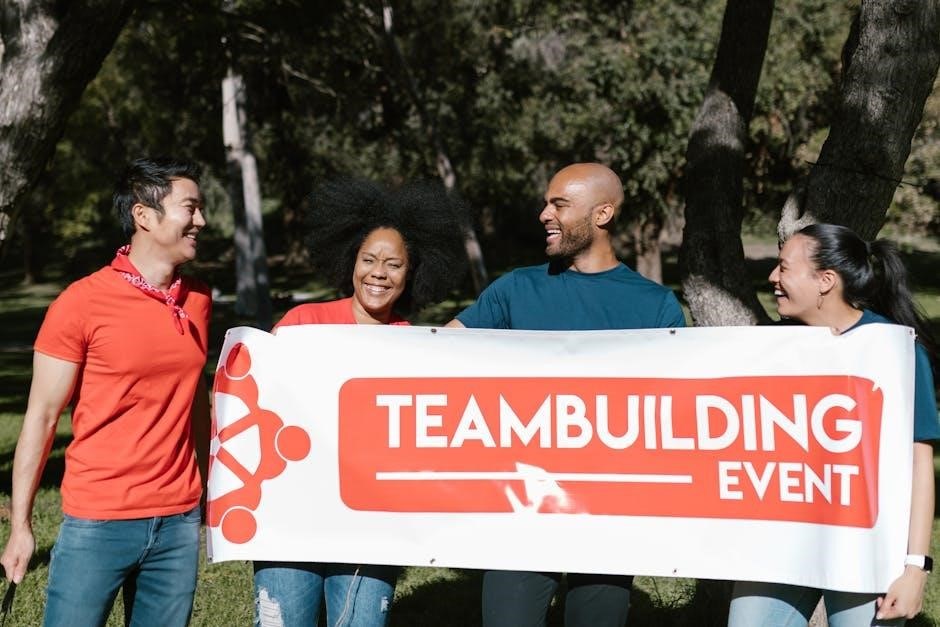
Benefits of Recovery Games
Recovery games strengthen peer bonds, foster open communication, and promote mindfulness. They encourage creativity, self-expression, and emotional healing, creating a supportive environment for personal growth and recovery.
Strengthening Peer Connections
Recovery games foster strong peer connections by encouraging collaboration and shared experiences. Activities like Recovery Bingo and Two Truths and a Lie create opportunities for participants to bond over common challenges and celebrate collective progress. These interactions build trust and camaraderie, essential for a supportive recovery environment. By engaging in games together, individuals feel less isolated and more connected, which is crucial for long-term sobriety and personal growth. The fun and engaging nature of these games helps participants relax and open up, laying the foundation for meaningful relationships that extend beyond the therapy session.
Encouraging Open Communication
Recovery games are designed to foster open communication by creating safe and engaging environments for participants to share their thoughts and feelings. Activities like Two Truths and a Lie or guided journaling encourage individuals to express themselves authentically, breaking down barriers and fostering trust. These games often involve sharing personal experiences, which helps participants feel heard and understood. By engaging in these exercises, individuals gain confidence in their ability to communicate openly, a crucial skill for building strong relationships and maintaining sobriety. Open communication also helps participants process emotions and challenges, further supporting their recovery journey.
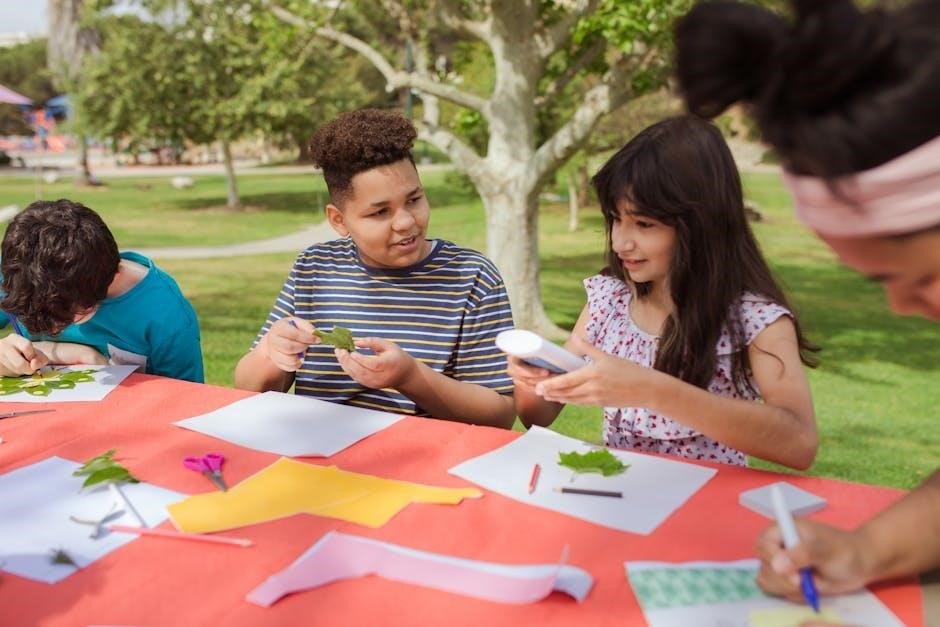
Promoting Mindfulness and Relaxation
Mindfulness and relaxation are key components of recovery, and specific games are designed to help participants achieve these states. Activities like Mindfulness and Meditation Sessions guide individuals through breathing exercises and reflection, reducing stress and anxiety. These exercises encourage participants to stay present, fostering emotional balance and inner peace. By incorporating mindfulness into recovery games, individuals learn to manage triggers and emotions more effectively. Relaxation techniques also enhance overall well-being, making it easier to navigate the challenges of recovery. These practices not only promote mental calm but also strengthen resilience, providing a foundation for long-term sobriety and personal growth. Regular mindfulness exercises can lead to lasting positive changes in both mental and emotional health.
Fostering Creativity and Self-Expression
Creativity and self-expression are powerful tools in recovery, helping individuals explore emotions and experiences in a non-traditional way. Activities like Creative Expression Through Art and Crafting for Recovery allow participants to channel their feelings into tangible creations, fostering personal growth. Vision Boards, for instance, enable individuals to visualize their recovery goals, promoting motivation and clarity. These exercises encourage participants to communicate their thoughts and emotions in unique ways, breaking down barriers and building confidence. By engaging in creative processes, individuals gain a deeper understanding of themselves and their journey, while also developing healthy coping mechanisms. Creativity becomes a therapeutic outlet, empowering participants to express themselves authentically and find meaning in their recovery process.
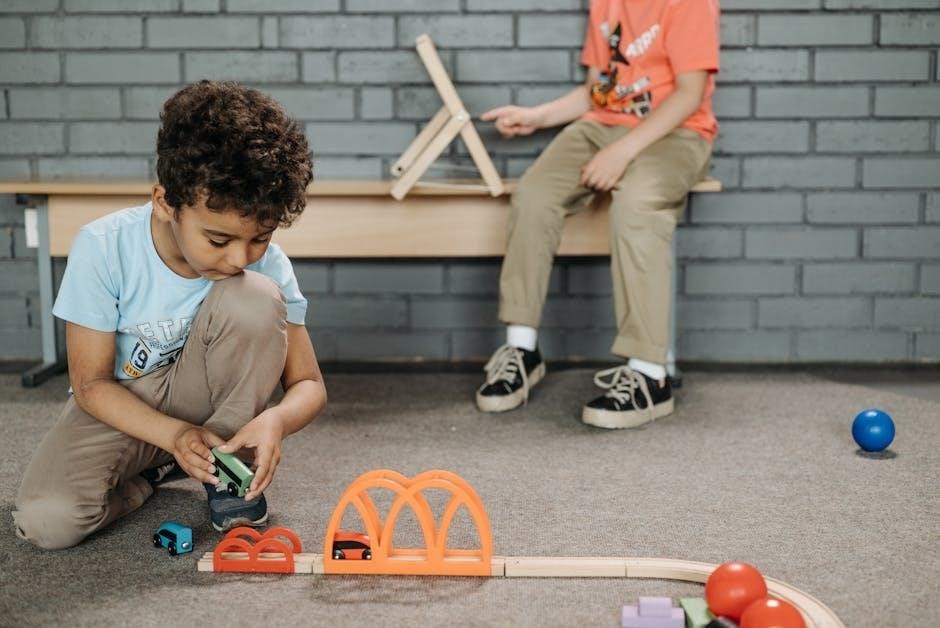
Types of Recovery Games
Recovery games include icebreakers, educational activities, mindfulness exercises, and creative expression, each designed to engage groups in meaningful interactions and foster personal growth.
Icebreaker Games for Initial Engagement
Icebreaker games are essential for initiating group therapy sessions, helping participants feel comfortable and connected. Activities like “Two Truths and a Lie” encourage sharing personal experiences, fostering trust and curiosity; The “Popsicle Sticks Activity” involves drawing sticks with questions, prompting thoughtful discussions and laughter. “Gratitude Graphs” allow individuals to visually express positive aspects of their lives, creating a uplifting atmosphere. These games break down barriers, reduce anxiety, and set a positive tone for deeper interactions. By engaging participants early, icebreakers lay the groundwork for meaningful connections and open communication, making them a cornerstone of recovery group therapy.
Creative Expression Activities
Creative expression activities empower individuals to articulate emotions and experiences through art, crafting, and vision boards. These exercises provide an outlet for self-reflection and healing. Vision boards, for instance, allow participants to visualize recovery goals, while guided journaling encourages introspective writing. Crafting projects, such as making masks or collages, offer a tactile way to explore feelings. These activities foster personal growth and self-awareness, helping individuals process their journey creatively. By engaging in art-based exercises, participants can express complex emotions non-verbally, creating a safe space for vulnerability and connection. Creative expression activities are a powerful tool in group therapy, promoting emotional release and deeper understanding of one’s recovery path.
Educational Games for Awareness
Educational games for awareness are designed to educate participants about addiction, recovery, and relapse prevention. These games use interactive formats to convey important information in an engaging way. For example, The Use, Abuse, and Recovery Journey Game involves players drawing cards that represent different stages of substance use and recovery. This game helps participants understand the progression of addiction and the challenges of recovery. Other games, like Blank Slate Relapse Prevention Game, focus on identifying triggers and developing coping strategies. By incorporating educational content into a game-like structure, these activities make learning about recovery accessible and memorable, fostering a deeper understanding of the recovery process and its complexities.

Mindfulness and Meditation Exercises
Mindfulness and meditation exercises are integral to recovery games, offering a calming and reflective space for participants. These activities help reduce stress and promote relaxation, encouraging individuals to focus on the present moment. Guided meditation sessions, often led by a facilitator, teach participants breathing techniques and visualization methods to manage emotions and cravings. Group meditation fosters a sense of unity, as everyone collectively works toward inner peace. These exercises also enhance self-awareness, helping individuals recognize triggers and develop healthier coping mechanisms. By incorporating mindfulness into recovery games, participants gain tools to navigate challenging emotions and maintain sobriety, creating a stronger foundation for long-term recovery and personal growth.
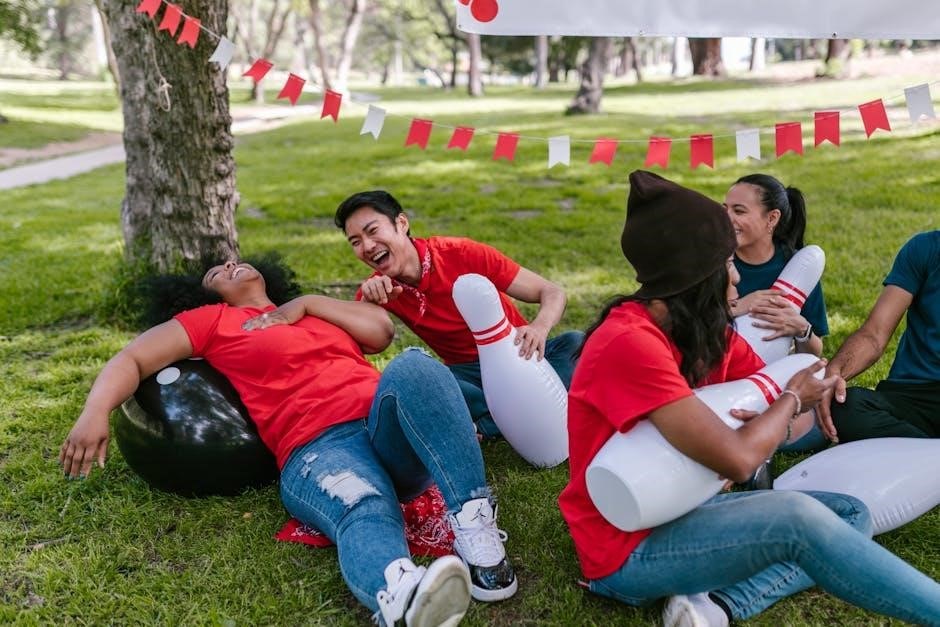
Popular Recovery Games
Popular recovery games include Gratitude Graphs, Popsicle Sticks, and The Chocolate Chip Game, fostering connections, reflection, and emotional growth in a supportive group setting.
Gratitude Graphs
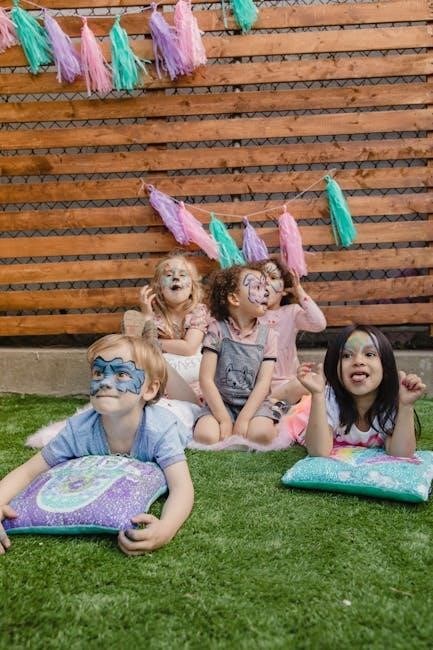
Gratitude Graphs are a meaningful activity where participants create visual representations of things they are thankful for. This exercise fosters positivity and mindfulness, encouraging individuals to reflect on their personal experiences and the good in their lives. By sharing their graphs, participants build connections and gain insight into each other’s perspectives. The activity is simple yet powerful, helping to shift focus from challenges to blessings. It promotes emotional healing and strengthens group bonds by celebrating gratitude collectively. Gratitude Graphs are an excellent tool for fostering a supportive and uplifting environment in recovery settings. They are often used in group therapy to encourage open dialogue and reinforce positive thinking patterns. This activity is both therapeutic and engaging, making it a popular choice for recovery groups.
Popsicle Sticks Activity
The Popsicle Sticks Activity is a simple yet engaging game that promotes teamwork and communication. Participants draw sticks labeled with questions or tasks, encouraging them to share thoughts or complete challenges. This activity breaks the ice, fostering a relaxed atmosphere where individuals can open up about their recovery journey. It helps build trust and strengthens peer connections by creating shared experiences. The activity is versatile, with sticks customizable to address various recovery topics. It’s a practical tool for group therapy, making sessions interactive and meaningful. By focusing on collaboration and mutual support, the Popsicle Sticks Activity enhances the recovery process in a fun and accessible way.
Crafting for Recovery
Crafting for Recovery is a therapeutic activity that uses creative expression to aid in the healing process. Participants engage in hands-on projects, such as making jewelry, painting, or constructing collages, to explore emotions and experiences. This activity fosters creativity and self-expression, allowing individuals to articulate feelings that may be difficult to verbalize. Crafting also provides a sense of accomplishment and pride, boosting self-esteem. It encourages mindfulness and relaxation, helping participants stay present and focused. Additionally, group crafting sessions promote bonding and mutual support, creating a safe space for sharing and connecting. This activity is widely used in recovery settings to enhance emotional well-being and provide a constructive outlet for personal growth.
The Chocolate Chip Game
The Chocolate Chip Game is a fun and engaging activity designed to promote open communication and trust within group settings. Participants pass around a bag of chocolate chips, each representing a specific topic or question related to recovery, such as challenges faced or goals achieved. When someone takes a chip, they share their thoughts or experiences aloud. This game encourages active listening and fosters a supportive environment where individuals feel comfortable expressing themselves. It helps break the ice, builds rapport, and allows participants to connect on a deeper level. The activity is simple yet effective, making it a popular choice for group therapy sessions focused on recovery and personal growth.
Recovery Bingo
Recovery Bingo is a engaging and interactive game designed to strengthen peer connections and foster open communication in group therapy settings. Participants receive bingo cards with questions or prompts related to recovery experiences, such as challenges overcome or coping strategies. As individuals share their responses, others mark the corresponding squares. This activity encourages active participation, empathy, and understanding among group members. It also serves as a tool for breaking the ice and creating a supportive environment where individuals feel comfortable discussing their recovery journeys. Recovery Bingo is a fun and effective way to promote bonding and shared learning, making it a popular choice for group therapy sessions focused on addiction recovery and personal growth.
Two Truths and a Lie
Two Truths and a Lie is a dynamic and engaging icebreaker game that fosters connection and trust within recovery groups. Each participant shares three statements—two true and one false—allowing others to guess which one is the lie. This activity encourages open communication, active listening, and teamwork. It also helps break down barriers, making it easier for individuals to share personal experiences in a safe and supportive environment. By promoting interaction and laughter, Two Truths and a Lie creates a lighthearted yet meaningful way to build rapport among group members, making it an excellent addition to recovery-focused group therapy sessions.
Head Rush Game
The Head Rush Game is a fast-paced, interactive activity designed to stimulate quick thinking and problem-solving skills. Players engage in a series of timed challenges, often involving trivia, riddles, or creative tasks, which encourage mental agility and focus. This game is particularly effective in recovery settings as it helps individuals manage stress and build confidence through achievable, fun objectives. By fostering a sense of accomplishment and camaraderie, the Head Rush Game supports emotional well-being and resilience. It also provides a healthy distraction from triggers, promoting mindfulness and joy in the recovery journey. Its dynamic nature makes it an excellent tool for breaking ice and enhancing group cohesion in therapy sessions.
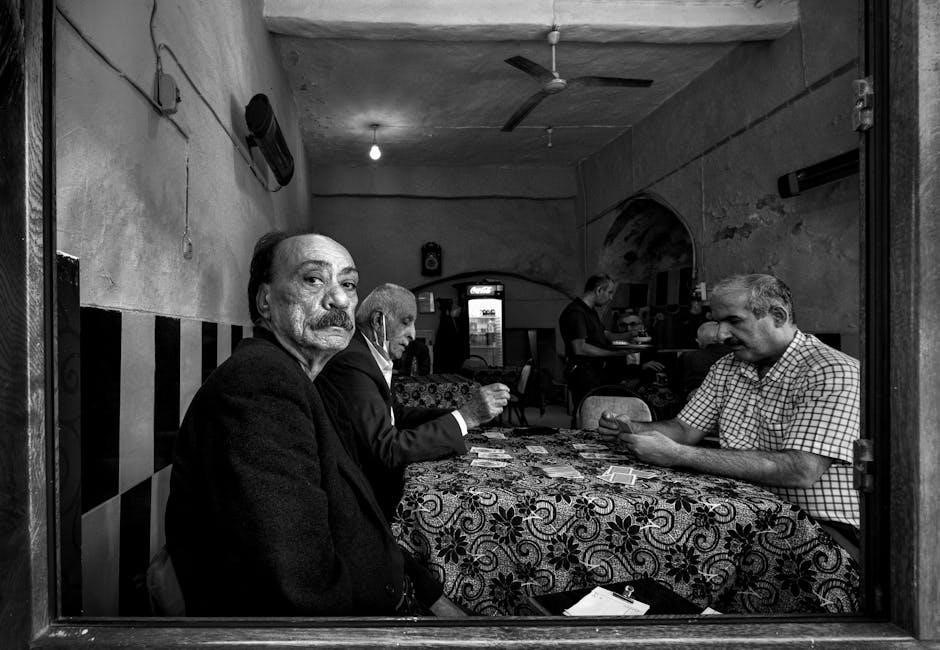
The Use, Abuse, and Recovery Journey Game
The Use, Abuse, and Recovery Journey Game is a powerful tool for exploring the cycle of substance use and the path to recovery. Players navigate through stages represented by cards from two decks: one focused on use and abuse, and the other on recovery. This interactive experience allows individuals to process emotions, identify triggers, and understand the consequences of their choices. The game fosters self-reflection and open dialogue, helping participants gain insights into their personal journey. It also encourages empathy and connection among group members by sharing experiences. This activity is particularly effective in group therapy, as it provides a safe space to address sensitive topics and reinforces the importance of support networks in the recovery process.
Blank Slate Relapse Prevention Game
The Blank Slate Relapse Prevention Game is a dynamic and interactive tool designed to help individuals identify triggers and develop coping strategies. Players engage with cards that represent various life scenarios, emotions, and challenges, encouraging them to think critically about how they would respond in real-life situations. This game fosters open discussion and collaboration, allowing participants to share insights and learn from one another. By addressing potential relapse triggers in a safe and supportive environment, the game empowers individuals to create personalized prevention plans. Its engaging format makes it an effective resource for group therapy, promoting accountability and resilience while reinforcing the importance of proactive recovery strategies.
The New Beginning Recovery Game

The New Beginning Recovery Game is a transformative tool designed to help individuals navigate their recovery journey. This interactive board game guides players through reflective stages, encouraging them to process past experiences, set realistic goals, and visualize a healthier future. By engaging with scenario cards and group discussions, participants gain insights into their personal triggers and develop practical coping strategies. The game emphasizes self-awareness, accountability, and the importance of community support. It also incorporates elements of mindfulness and relapse prevention, helping individuals create a personalized roadmap for long-term sobriety. The New Beginning Recovery Game fosters a sense of hope and renewal, making it an invaluable resource for group therapy settings focused on sustainable recovery.

Role-Playing Scenarios
Role-playing scenarios are dynamic activities that allow participants to explore real-life situations in a controlled environment. These exercises simulate common challenges individuals may face during recovery, such as resisting peer pressure or managing stress. By acting out various roles, participants practice effective communication, decision-making, and problem-solving skills. Group members can provide feedback and support, fostering a safe space for learning and growth. Role-playing also helps individuals build confidence in handling difficult conversations and navigating high-risk situations. This interactive approach enhances emotional intelligence and prepares participants for real-world scenarios, making it a valuable tool in group therapy settings focused on relapse prevention and long-term recovery success.
Relapse Prevention Bingo
Relapse Prevention Bingo is an engaging and interactive game designed to educate and support individuals in maintaining sobriety. This activity uses bingo cards with specific questions or scenarios related to recovery, such as triggers, coping strategies, or relapse warning signs. Players mark their cards as facilitators or peers discuss these topics, fostering open dialogue and shared experiences. The game encourages active participation, helping individuals identify personal risks and develop practical skills to avoid relapse. By incorporating fun and structure, Relapse Prevention Bingo creates a supportive environment for learning and growth, while also strengthening peer connections and accountability within the group.
Creative Expression Through Art
Creative expression through art serves as a powerful tool in recovery, allowing individuals to explore and communicate emotions non-verbally. Activities such as drawing, painting, or crafting provide an outlet for self-reflection and healing. Participants can create visual representations of their recovery journey, goals, or challenges, fostering a deeper understanding of their experiences. This form of expression encourages mindfulness and relaxation, reducing stress and anxiety. Art also promotes self-discovery and empowerment, enabling individuals to process complex emotions in a safe and supportive group environment. By channeling creativity, participants build confidence and develop a sense of accomplishment, which are essential for sustained recovery and personal growth.
Mindfulness and Meditation Sessions
Mindfulness and meditation sessions are integral to recovery, fostering relaxation and self-awareness. These exercises guide participants to focus on the present, reducing stress and emotional overwhelm. Techniques include deep breathing, visualization, and body scans, helping individuals reconnect with their inner selves. Regular practice enhances emotional regulation and resilience, crucial for recovery. Group meditation also encourages a sense of community, as shared experiences create bonds among participants. Mindfulness activities are often paired with journaling or discussion, allowing deeper reflection and insight. By cultivating calm and clarity, mindfulness sessions empower individuals to navigate challenges with greater ease and positivity, supporting their overall well-being and recovery journey.
Vision Boards for Goal Setting
Vision boards are a creative tool used in recovery to help individuals visualize and set personal goals. Participants gather images, words, and phrases that represent their aspirations and desires, arranging them on a board to create a visual representation of their recovery journey. This activity encourages self-reflection and clarity, empowering individuals to take ownership of their goals. Vision boards also serve as a motivational reminder of what they are working toward, fostering a sense of purpose and direction. By sharing their boards with the group, participants can gain support and encouragement, reinforcing their commitment to achieving their objectives and maintaining progress in recovery.
Slogan Slog
Slogan Slog is a dynamic recovery activity that reinforces positive mantras and affirmations. Participants create or select empowering slogans that resonate with their personal recovery journey. These slogans are then shared within the group, fostering a collective sense of motivation and unity. The activity encourages individuals to reflect on the principles that guide their recovery, such as resilience, gratitude, or perseverance. By embedding these mantras into their mindset, participants are reminded of their strengths and the importance of maintaining a positive outlook. Slogan Slog not only strengthens individual resolve but also enhances group cohesion, creating a supportive environment where shared experiences and encouragement thrive.
Guided Journaling
Guided journaling is a therapeutic activity that encourages participants to reflect on their recovery journey through structured writing prompts. It provides a safe space for individuals to process emotions, explore personal growth, and document progress. Facilitators offer specific questions or themes, such as gratitude, challenges, or goals, to guide the writing process. This activity fosters self-awareness and introspection, helping participants identify patterns and strengths. Journaling also serves as a tool for mindfulness, allowing individuals to focus on the present moment. Sharing entries within the group, if comfortable, can deepen connections and provide mutual support. Guided journaling is a powerful way to nurture emotional healing and empower individuals in their recovery process.